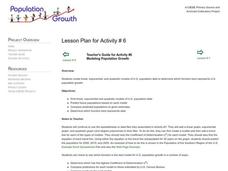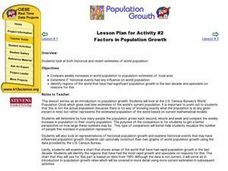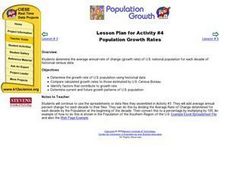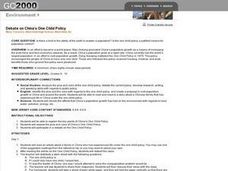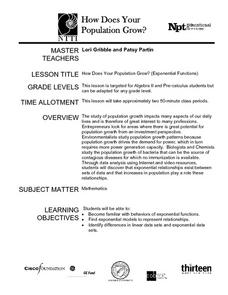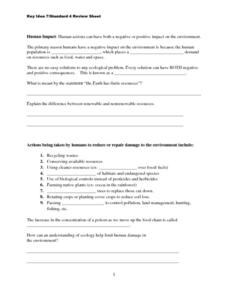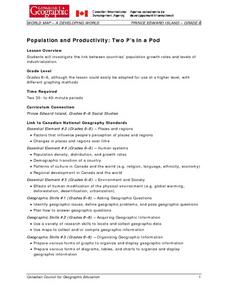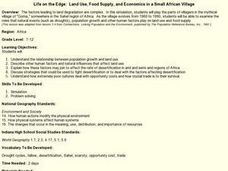Scholastic
Study Jams! Population Growth
Along came a spider, who sat down beside her. She screamed, but RJ wouldn't smash it because spiders are a limiting factor for other insects in an ecosystem. In this video, other common limiting factors for populations are listed....
Population Education
Population Map
Here is a very interesting graphic of a world map where each country's size is adjusted accordingly to its population. The bottom row of the document also includes several maps depicting the major shifts and growth of the world...
PBS
Population Simulation with M&M's
Math and M&Ms® go great together when introducing a modeling activity. Allow your learners to simulate population growth and decay of fish in a pond and share their reasoning for the change in fish. With such an impact we have on our...
Curated OER
Modeling Population Growth
Students create linear, exponential, and quadratic models of U.S. population data to determine which function best represents U.S. population growth. They predict future populations based on each model.
Curated OER
Factors In Population Growth
Students examine both historical and recent estimates of world population. They identify regions of the world that have had significant population growth in the last decade and speculate on reasons for this.
Curated OER
AP: Chapter 54: Ecosystems
A lot of learning is packed into these 23 questions about ecosystems. Advanced biology classes apply their knowledge of communities, productivity, biogeochemical cycles, and human impact on the environment by writing short answers for...
Curated OER
Castle in the Sky
Students research trends on housing, including predictions about environmental factors, population growth, technology, and their effects on housing in the future. They become familiar with the work of Maxfield Parrish and his use of...
Curated OER
Population Growth Rates
Students determine the average annual rate of change (growth rate) of U.S. national population for each decade of historical census data.
Curated OER
Debate on China's One Child Policy
High schoolers learn about China's One Child Policy. They read an article about a specific family's experience under the policy (not included) and research and explain the key points of the policy. They assess the pros and cons in a...
Curated OER
AP: Chapter 52: Population Ecology
For AP biology or ecology classes, here is a worksheet that explores population growth. Carrying capacity, limiting factors, and k-strategies are dealt with using short-answer questions.
Curated OER
How Does Your Population Grown?
Do you know how the population has grown of your community? Can you predict the population over the next half century? Can we find an algebraic model that matches our data? These along with many more questions can be researched by...
Curated OER
Population Growth
A single slide depicts the normal population growth curve. The curve reaches a steady state when the population reaches carrying capacity. You can use this slide when teaching about populations, but it may be more effective to insert it...
Curated OER
Whoa! Slow Down-Some of You!
Students analyze demographic data (growth rate, natural increase, fertility rate, crude birth rates, and crude death rates) and determine which areas of the world contain the fastest and slowest growth rates. They construct population...
Curated OER
Create a City: An Urban Planning Exercise
Students explore the effects of population growth in Arizona. In this history activity, students work in small groups to create a "perfect" city. Activities include examining the Arizona census results then discussing the importance of...
Curated OER
Displaying Populations: Jellybeans, Paper and People
Students investigate the factors affecting population growth. In this biology lesson, students collect data from the lab and graph them. They estimate population size using a mathematical formula.
Curated OER
Environmental Limitations
Seventh graders study the environmental factors that affect population growth. In this biology lesson, 7th graders create a city following certain criteria. They present their posters in class.
Curated OER
Calculating Population Growth for a Region
Young scholars research population growth of regions of Canada. In this Social Studies lesson, students use included links on the Internet to find information about population growth in areas of Canada. A worksheet for each region is...
Curated OER
Logistic Growth
Through the exploration of population growth of a bacteria population, high schoolers learn about and observe bacteria population over a 20 hour period. Students graph the population growth using a scatter plot and discuss its logistic...
Curated OER
Bacteria and Illness
Students research information on bacterium and their relationship to food borne diseases. In this science lesson plan, students complete internet research to construct and analyze the growth cure of common bacterium and food-borne...
Curated OER
Standard 4 Review-Human Impact
In this human impact on the environment worksheet, students fill in the blanks to complete sentences about how humans have negatively affected the environment. They complete sentences about the actions taken to reduce and repair the...
Curated OER
Line Graphs
In this line graphs activity, 8th graders solve and complete 20 different problems that include reading various line graphs. First, they use the information provided in each line graph to determine the correct response to each of the...
Curated OER
Population and Productivity: Two P's in a Pod
Students investigate the link between countries' population growth rates and levels of industrialization. They observe that, over time, as a country becomes more industrialized, its population growth rate decreases.
Curated OER
Pandemics and Epidemics
Students evaluate data related to population growth, along with problems and soultions: disease cvontrol. They are able to explain how changes in habitat may affect organisms. Students evaluate evolutionary theories and processes.
Curated OER
Life on the Edge: Land Use, Food Supply, and Economics in a Small African Village
Students examine the roles that natural events (such as droughts), population growth and other human factors play on land use and food supply.





